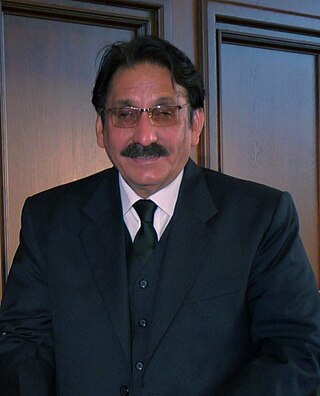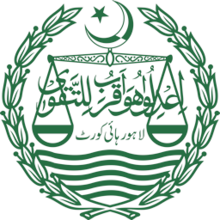
The Supreme Court of Pakistan is the apex court in the judicial hierarchy of the Islamic Republic of Pakistan.

Iftikhar Muhammad Chaudhry is a Pakistani jurist who served as the 20th Chief Justice of Pakistan over three non-consecutive terms from 29 June 2005 to 11 December 2013.

The Lahore High Court is a provincial court house based in Lahore, Punjab, Pakistan. It was established as a high court on 21 March 1882. The Lahore High Court has jurisdiction over the province of Punjab. The High Court's principal seat is in Lahore, but there are benches in three other cities of the province: Rawalpindi, Multan and Bahawalpur.

Javed Iqbal ; is the retired chairman of the National Accountability Bureau (NAB) of Pakistan, in office from 11 October 2017 to 3 June 2022. He is also a retired Senior Justice of the Supreme Court of Pakistan.

The High Court of Sindh is the highest judicial institution of the Pakistani province of Sindh. Established in 1906, the Court situated in the provincial capital at Karachi. Apart from being the highest Court of Appeal for Sindh in civil and criminal matters, the Court was the District Court and the Court of Session in Karachi.

Chief Justice of Pakistan Iftikhar Muhammad Chaudhry was made a "non-functional Chief Justice" on 9 March 2007. In so acting, President Pervez Musharraf invoked two main clauses of the Constitution of Pakistan. The suspension evoked a nationwide popular mass protest movement led by lawyers, known as the Lawyers' Movement and eventually culminated with the Pakistan Long March.

The Peshawar High Court is the provincial and highest judicial institution of Khyber Pakhtunkhwa in Pakistan. It is located in the provincial capital Peshawar. The Parliament passed a bill extending the jurisdiction of the Supreme Court (SC) and the Peshawar High Court to Federally Administered Tribal Areas (FATA), one of a handful of reforms paving the way for a merger of the tribal areas with Khyber Pakhtunkhwa.

A state of emergency was declared by President of Pakistan Pervez Musharraf on 3 November 2007 which lasted until 15 December 2007, during which the Constitution of Pakistan was suspended. When the state of emergency was declared, Musharraf controversially held both positions of President and Chief of Army Staff. He later resigned as army chief 25 days into the emergency on 28 November. The state of emergency and its responses are generally attributed to the controversies surrounding the re-election of Musharraf during the presidential election on 6 October 2007, including his holding of both offices of President and Chief of Army Staff at the time.

Abdul Hameed Dogar is a Pakistani jurist who served as the former Justice of Sindh High Court, before being appointed Chief Justice of Pakistan by President Pervez Musharraf, after he dismissed the superior judiciary and declared emergency rule in 2007.

Sayed Zahid Hussain is a former judge of the Supreme Court of Pakistan and a former chief justice of the Lahore High Court, who also held the position of being the Chairman of The Federal Service Tribunal, and until recently served as the law consultant to the President of Pakistan to hear the appeals against order of Federal Obudsman.

Sardar Muhammad Aslam was a Pakistani jurist, lawyer, and member justice of the Lahore High Court. He was also a justice of the Supreme Court of Pakistan and a former chief justice of the Islamabad High Court. However, as result of Constitution Petition No. 09 of 2009 and Constitution Petition No. 08 of 2009 in the Supreme Court of Pakistan, on 31 July 2009, the court held his elevation to Supreme Court as unconstitutional, void ab initio and of no legal effect. In addition in the same decision, the institution of Islamabad High Court was held as unconstitutional and of no legal effect.

The Lawyers' Movement, also known as the Movement for the Restoration of Judiciary or the Black Coat Protests, was the popular mass protest movement initiated by the lawyers of Pakistan in response to the former president and army chief Pervez Musharraf's actions of 9 March 2007 when he unconstitutionally suspended Iftikhar Muhammad Chaudhry as the chief justice of Pakistan's Supreme Court. Following the suspension of the chief justice, the Supreme Court Bar Association (SCBA) declared the judge's removal as an "assault on the independence of judiciary" and was backed by several political parties.

Muhammad Bilal Khan was a Justice in the Lahore High Court in Pakistan.

Sardar Muhammad Raza was Chief Election Commissioner from 6 December 2014 to 5 December 2019. who previously served as retired judge of the Supreme Court of Pakistan and as Chief Justice of the Peshawar High Court. Khan was born in the Namli Maira village in the district of Abbottabad on 10 February 1945.

Moin ud Din Javed Buttar was a former justice of the Supreme Court of Pakistan, retired on medical grounds.

Tassaduq Hussain Jillani is a Pakistani judge who served as the 21st Chief Justice of Pakistan from 2013 to 2014. He previously served as a justice of the Supreme Court of Pakistan from 2004, after being nominated as a justice of the Lahore High Court by Prime Minister Benazir Bhutto in 1994.

Falak Sher is a former justice of Supreme Court of Pakistan and a former Chief Justice of Lahore High Court.

Mohammad Nawaz Abbasi is former justice of the Supreme Court of Pakistan and a former justice of Lahore High Court.

The Provisional Constitutional Order Judges case refers to cases heard and decided by the Pakistan Supreme Court pertaining to the High Court and Supreme Court judges who took their oath of offices under the Provisional Constitutional Order in 2007. On 3 November 2007, then-President Pervez Musharraf declared a Provisional Constitutional Order, which declared a state of emergency and suspends the Constitution of Pakistan. Under this emergency law, all High court judges, including the Supreme Court justices, were asked to take oath under this Provisional Constitutional Order. Those who did not were placed under effective house arrest. A seven-member bench issued a restraining order on the same day, barring the government from implementing emergency rule and urging other government officials to not help do so.

The History of the Supreme Court of Pakistan, organised by the Chief Justice of Pakistan, follows from its constitutional establishment in 1947 till its recent events. The Supreme Court of Pakistan is the highest appellate court of the country and court of last resort— the final arbiter of the law and the Constitution.








